When 9/11 truthers confronted Tucker Carlson on the campaign trail ahead of the 2012 Iowa caucuses, the famous former host of CNN’s Crossfire didn’t mince words with the conspiracy theorists.
“It’s filthy to say things like that with no evidence, and you have none, so you should stop,” Carlson said.
What about the family members of 9/11 victims who were asking questions? “Parasites like you make it much worse for them,” he replied.
The 9/11 truthers also confronted Carlson about his decision to abruptly leave a 2008 Ron Paul rally. Ahead of the 2008 Iowa caucuses, Carlson, who initially supported the Iraq war, wrote a profile of Ron Paul for The New Republic in which he concluded that he admired the anti-war Texas Republican congressman and presidential candidate so much that he wanted to wear a Ron Paul sticker. In September 2008, Carlson was emceeing a Ron Paul rally in Minneapolis where 12,000 supporters were gathered, but he walked out of the convention after Jesse Ventura, the former Minnesota governor, began spouting 9/11 conspiracy theories.
“I was enraged by it,” Carlson told the truthers in Iowa. “It just totally discredits libertarianism and the ideas of Ron Paul and liberty itself—if you start accusing people of things on the basis of no evidence.”
When a truther asked him about the “evidence” presented by Alex Jones—the famous all-around conspiracy theorist—Carlson replied: “I don’t know Alex Jones, I don’t have any feelings about Alex Jones.”
When the camera in his face stopped rolling, Carlson playfully said: “Alex Jones? F–k you … Alex Jones freaks me out.”
When he then realized a different camera was still rolling, Carlson said: “I don’t really know much about him at all.”
Last week, the Tucker Carlson Live tour arrived in Reading, Pennsylvania, with a special guest: Alex Jones. Fans snapped up seats via Ticketmaster for $34 to $199. VIP tickets, which typically go for up to $1,600, sold out. “Alex Jones is my friend,” Carlson told the crowd in Pennsylvania. “There's nothing to be ashamed of.”
Jones is such a good friend, in fact, he was one of Carlson’s first podcast guests after the launch of the Tucker Carlson Network, where annual subscriptions go for $72, back in December 2023. “Alex Jones is not a crazy person,” Carlson said in the opening monologue of the December 2023 podcast with Jones, who a year before was ordered to pay $1 billion in defamation damages for claiming the Sandy Hook Elementary School massacre was “staged” with crisis actors.
Carlson, the great debater and interrogator of Crossfire and Fox News fame, asked Jones no tough questions during the podcast. He actually glossed over both conspiracy theories. “It was more than a billion-dollar judgment for saying something other people didn’t like, I guess,” Carlson said of the Sandy Hook defamation judgment. “They effectively blamed you for a school shooting that you were not present at.” At his defamation trial, Jones admitted the massacre was “100 percent real.”
What about the 9/11 conspiracies Carlson found so vile back in 2012? “I’ll just confess that I first heard of Alex Jones when he questioned the official story behind 9/11 and I, speaking for myself, was deeply offended by this. I didn’t take any time to find out what he was saying,” said Carlson, who now calls Jones a “prophet” who predicted 9/11.
Alex Jones “called 9/11, and they tried to put him in jail for it,” Carlson told the crowd gathered in Pennsylvania on September 23. Carlson’s toughest question for Jones that evening: “What’s it like to be vindicated on everything?”
What happened to Tucker? It’s a question you hear a lot around Washington, D.C., where the former Fox News star is usually referred to by his first name alone, not because of his fame—like Hillary or Oprah—but because pretty much everyone had some personal contact with him. Tucker was such a man about town and media fixture that, in 2021, 16 reporters told the New York Times that he was a great source for Trump White House gossip and news.
Pretty much everyone, including those who knew him well, remains perplexed by his transformation in the Trump era. “It’s been a parlor game for 10 years now: What happened to Tucker Carlson? Because everybody knew him, and everybody’s trying to figure it out,” said Andrew Ferguson, who was Tucker’s colleague for five years at The Weekly Standard.
What happened to Tucker is that he went from being a P.J. O’Rourke libertarian in the 1990s to an Alex Jones nationalist in the 2020s. Why did it happen? There are various theories—fame, ego, power, money, ideology, lunacy. But none is satisfying by itself.
Tucker’s rise to media stardom.
Tucker Swanson McNear Carlson grew up in La Jolla, California, and followed in the footsteps of his father, Dick Carlson, to a career in journalism.
“Tucker is strongly motivated. He’s interested in everything. He knows everything. He read War and Peace when he was like 8 or 9 years old,” Dick Carlson said in a 2006 C-SPAN interview. Tucker’s father started his career in journalism in California and later served as director for Voice of America during the Reagan administration, ambassador to the Republic of Seychelles for President George H.W. Bush, and vice chairman for the Foundation for Defense of Democracies, a neoconservative foreign policy think tank, from 2003 to 2011. Tucker’s mother, Lisa McNear Lombardi, an artist who was often described as a bohemian, abandoned her husband and two children, Tucker and his younger brother Buckley, when Tucker was 6. He never saw his mother, who died in 2011, again.
“When you are a little kid and your mom is just not interested or doesn’t like you, you just have to come to terms with it … Not everyone likes you, that’s what I learned,” Tucker told the Wall Street Journal in July. When Tucker was 10, his father was remarried to Patricia Swanson, an heiress to the frozen-food company, who adopted Tucker and Buckley. At age 14, Tucker went off to boarding school in Rhode Island, where he demonstrated a fondness for and skill at debate, and later attended Trinity College.*
Tucker got his first big break in Washington journalism when he was hired as a 26-year-old staff writer at The Weekly Standard—a new conservative magazine founded by Bill Kristol, Fred Barnes, and John Podhoretz—before the publication launched in 1995. “I called everyone I ever met and begged each one of them to beg Kristol to hire me,” Tucker told Howard Kurtz in 1999.
After bombing his job interview, unable to impress the editors with good story ideas, Tucker wasn’t going to get the job. But executive editor Fred Barnes’s wife Barbara urged him to reconsider—Tucker’s wife Susie was a teacher at the school attended by the Barnes’ young children, after all. Barnes persuaded his colleagues to give Tucker a second chance and told Tucker to bring some story ideas this time. At his callback interview, Tucker had great ideas and got the job.
Before the first issue went to press, the editors realized they had hired an exceptional talent. Andrew Ferguson, a senior editor at The Weekly Standard for almost its entire 23-year history, recalls that in the summer before the magazine’s September 1995 launch, staffers were busy in the office building up a backlog of stories, when deputy editor John Podhoretz walked into his office carrying a hard copy of one of Carlson’s articles. Podhoretz slapped the print copy “against his knee, saying, the guy was born knowing how to write a magazine article. It was just a fully formed, perfect piece.”
Tucker just kept on producing pieces that “were the perfect balance of seriousness and levity, and he wasn’t afraid to report,” Ferguson told The Dispatch. While some staffers recalled his coverage of Sen. John McCain as among his best work, Ferguson thought Tucker “drank the McCain Kool-Aid” a bit too much on the campaign bus and liked Tucker’s short first-person essays, known at the magazine as Casuals, the best. “He just had such a great light touch.”
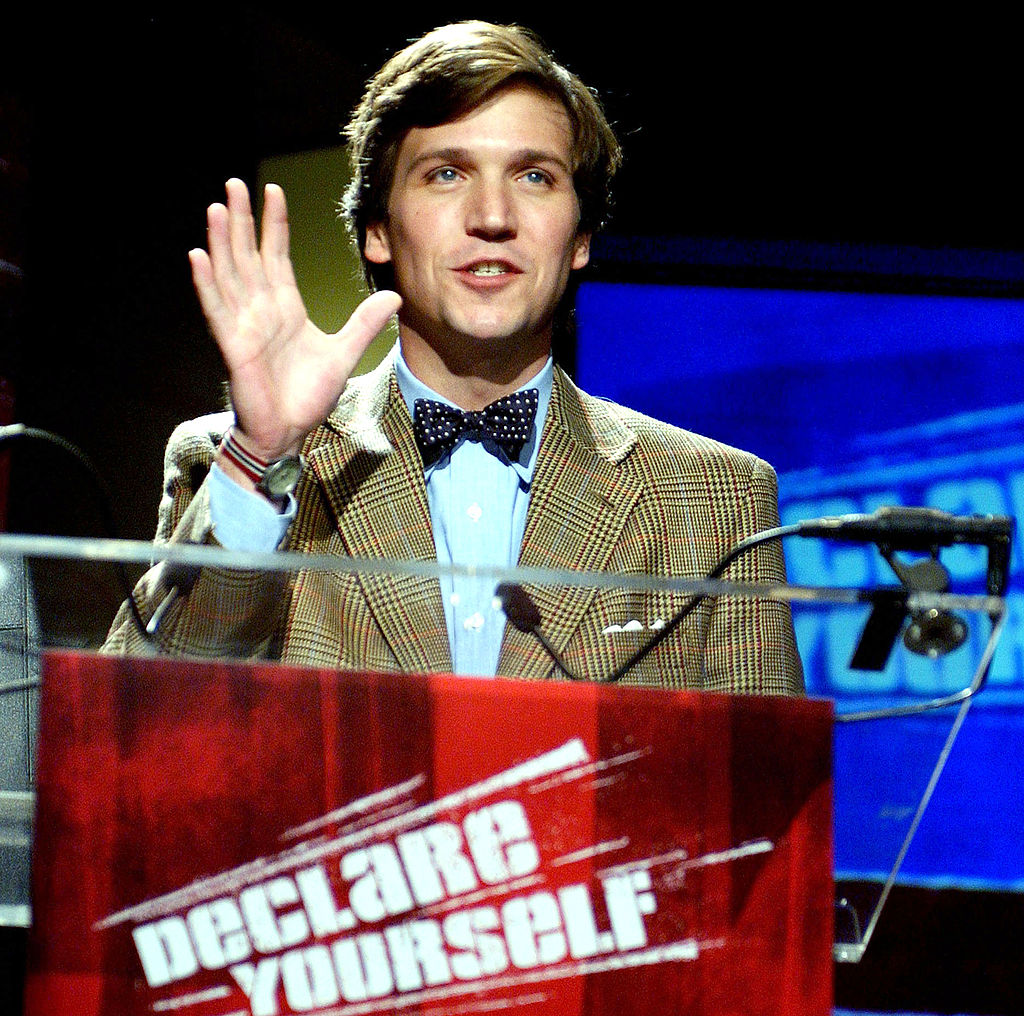
Tucker’s talent was quickly recognized by other outlets, and he was soon freelancing for Esquire, Forbes, and Talk magazine. He left The Standard after the 2000 election for a TV contract at CNN—by his own account, he needed the money for his growing family. His TV stardom first peaked as co-host of Crossfire, but the program was canceled in January 2005 after the Daily Show’s Jon Stewart berated its hosts on air for “hurting America” with shallow and partisan debates. Tucker hosted a show at MSNBC—simply titled Tucker—from 2005 until its cancellation in 2008. In 2009, Tucker was booed at the Conservative Political Action Conference after saying conservatives needed their own outlets that mirrored the New York Times—dedicated to news-gathering and accuracy—and in 2010 founded the Daily Caller with the intent to be just that kind of news organization.
The rise of Donald Trump provided an opening for Tucker Carlson’s return to TV stardom at Fox News, where Carlson had started to work as a contributor in 2009 and as co-host of Fox & Friends Weekend from 2013 to 2016. “Donald Trump Is Shocking, Vulgar and Right,” declared the headline of a Politico magazine article written by Carlson and published days before the 2016 Iowa caucuses. Carlson saw a lot to like in Trump as an anti-establishment wrecking ball, and with few Fox News contributors willing to defend Trump early in the primary, Carlson began getting more airtime in the evenings. Just before Election Day in 2016, he was named the host of the 7 p.m. show in need of a permanent host. The departure of Megyn Kelly and the defenestration of Bill O’Reilly paved the way for Carlson to inherit the coveted 8 p.m. timeslot in 2017.
Carlson had the highest ratings in cable news, but his tenure as a primetime star was marked by increasingly bizarre behavior that became even worse after he was fired by Fox in April 2023. The pundit who started out somewhat anti-anti-Trump—spending more time attacking Trump’s enemies than defending him—ended up shilling for Vladimir Putin, promoting conspiracy theories, and elevating antisemites.
The latest round of “What happened to Tucker?” kicked off on September 2, when he hosted a little-known amateur historian named Darryl Cooper on his podcast. Carlson began the show by praising Cooper’s “relentless curiosity and honesty” before adding: “I want you to be widely recognized as the most important historian in the United States, because I think that you are.” Cooper went on to tell his audience that Winston Churchill was “the chief villain of the Second World War” for letting the war expand beyond the invasion of Poland in 1939. Carlson didn’t bother to ask Cooper about the fact that Churchill didn’t take power until after the invasion of Belgium, Holland, and Luxembourg in 1940. Nor did Carlson press Cooper when he suggested the Holocaust happened almost by accident. The Nazi army was “completely unprepared to deal with the millions and millions of prisoners of war, of local political prisoners … They just threw these people into camps, and millions of people ended up dead there,” Cooper said. He then likened Nazi Germany’s invasion of Poland to Israel’s defensive war against Hamas because neither nation had a “plan to care” for civilians: “I argue with my Zionist interlocutors about this all the time, with regard to the current war in Gaza,” said Cooper, who also claimed that Churchill may have been a Zionist because of “the financiers” who bailed him out.
Cooper’s true nature was obvious before he went on the Tucker Carlson podcast. “Guten morgen fellas,” Cooper tweeted a couple of weeks before appearing on Carlson’s show, while posting a photo of Nazi-themed coffee mug. A month before that, Cooper tweeted a photo of Hitler in front of the Eiffel Tower and said the picture was “infinitely preferable in virtually every way” to a photo of the Paris Olympics opening ceremony when drag queens appeared to mock the Last Supper. After the podcast aired, Cooper, who declined an offer to debate an actual World War II historian, tweeted that Hitler initially sought an “acceptable solution to the Jewish problem.” Cooper’s Substack subscriptions reportedly soared, and his own podcast topped the charts on Apple.
Some who knew Carlson struggle to explain his elevation of Cooper. “Beneath that cheerful and outgoing and friendly exterior, Tucker is a cauldron of anger and resentment, and I don’t know what it’s about exactly,” said a former Fox News colleague. “It’s almost like he’s trying to aggravate everybody.” The former colleague, who still thinks Carlson is “probably as talented as anybody in our business” right now, ventured a guess that “doing stuff like elevating this crazy historian and saying other quasi-outrageous things” helps Carlson have an impact.
Indeed, the Cooper interview accomplished something Carlson has only done one other time since being fired from Fox News last year: He got the entire political media ecosystem to pay attention to him.
The last time Carlson set the political world aflame was in February, when he flew to Russia to conduct a softball interview with Vladimir Putin and record an anti-American propaganda video touting the glories of the Russian grocery store. “Coming to a Russian grocery store, the ‘heart of evil,’ and seeing what things cost and how they live, it will radicalize you against our leaders,” Carlson said after learning how much $100 could buy in a Russian grocery store—never bothering to tell his viewers that the average Russian household spends 29 percent of its budget on groceries, while the average American household spends less than 7 percent. It’s not clear when he last went grocery shopping in the United States. In a text message to The Dispatch, Carlson declined an interview request for this article.
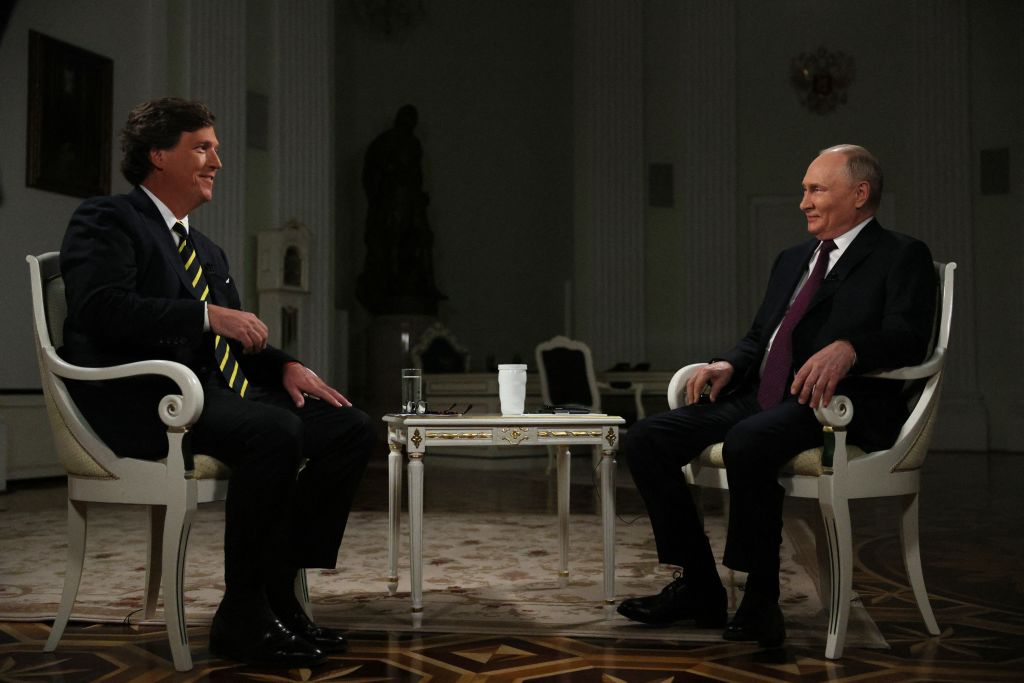
The business of being Tucker Carlson.
Tucker Carlson doesn’t need to be boosting a Nazi-revisionist historian or shilling for Putin for the money—he was making $20 million a year at Fox News. But he has found a way to make his post-Fox career very lucrative.
The timing of his Cooper interview, a couple days before his Tucker Carlson Live Tour kicked off, was notable. “Every best-selling political author is reviled by large numbers of people,” Carlson wrote in the introduction to his 2021 book, The Long Slide, a collection of old magazine articles. “If one side hate hates [sic] you, the other side buys your books. There isn’t a marketing director in the country who doesn’t know that.” What’s good marketing advice for booksellers is also good marketing advice for podcasters.
In mid-July, the Tucker Carlson Network told the Wall Street Journal it had 200,000 paying subscribers. By September 20, the Tucker Carlson Network claimed to have 400,000 paying subscribers. If true, that subscription revenue could exceed Carlson’s $20 million Fox contract by at least $9 million. That’s not even counting the revenue from hosting one of the most popular podcasts in the country, the revenue from Twitter, and ticket sales from the Tucker Carlson Live tour. This November, Carlson will start selling a personal brand of nicotine pouches, called Alp, to compete with Zyn.
For many celebrities, of course, there comes a point when the money isn’t really about the money. It’s about ego, making a point, or succeeding for the sake of success.
“They go to these industries, like becoming a pop singer or becoming a Hollywood actor, because they’re seeking fame and to fill a void,” Megyn Kelly told Carlson at a September 12 Tucker Carlson Live event.
“Some people are self-aware,” Kelly said, pointing to an Oscars speech by Robert Downey Jr. where the “very first thing he said was, I’d like to thank my terrible childhood.” But the vast majority of celebrities, Kelly told Carlson, aren’t self-aware. They think: “If I can just become rich, if the people will just love me, if people will give me a golden statue, somehow I'll feel validated, like I matter, like none of the bad stuff that happened to me is consequential, and what they inevitably find is it fills no voids.”
“I don’t think this level of fame is healthy for anyone,” said Kelly, who had been talking about Taylor Swift. She warned against letting kids idolize pop stars because celebrities “can use that power for evil.”
“That is so wise,” Carlson told Kelly.
Carlson asked Kelly whether her own experience as a TV star shaped her views.
“Yes, because I never was attracted to fame,” Kelly replied. She later spoke of the trauma she experienced as a TV star. Her NBC News show was canceled in 2018 after she questioned whether wearing blackface to dress up like Diana Ross for Halloween was racist. Kelly tearfully apologized for the remarks on air but lost her job—a punishment few Americans thought fair—and was paid out the remainder of her $69 million contract.
“Once you get through the trauma,” Kelly told Carlson, you learn life lessons. “I’ve gotten closer to who I really am, and it’s forced me to examine my own values in a way few events will.”
“I love that,” Carlson replied.
“Maybe your life is a testament to what the future of media will be,” Carlson told Kelly toward the end of the event, pointing to her media empire.
“My life and yours, Tucker.”
To this day, the former Fox colleague of Carlson’s told The Dispatch, there’s never been a satisfactory explanation of Carlson’s firing from the network. It occurred shortly after Fox’s $787 million defamation settlement with Dominion Voting Systems, but Carlson actually pushed back on those specific lies—challenging Sidney Powell on air to produce evidence voting machines changed vote totals—while happily promoting other stolen-election claims. Carlson’s firing also occurred a couple of months before Fox settled a $12 million lawsuit with Abby Grossberg, a Carlson staffer who claimed to face harassment from colleagues in the office—but that was chump change compared to the Dominion settlement. One theory is that Carlson had somehow gotten too big for the network.
Carlson may no longer strike fear into the hearts of congressional Republicans the way he once did with his ability to communicate with nearly 3 million conservatives who will tune into Fox News at 8 p.m. no matter who is hosting. But with a very popular podcast, hundreds of thousands of subscribers to the Tucker Carlson Network, and speaking tours, there’s no denying that he’s building a commercially successful media empire of his own. “Television is a purely democratic medium. Success has one measure: the number of people who watch,” Carlson wrote in his 2003 book, Politicians, Partisans, and Parasites: My Adventures in Cable News. “Every viewer’s opinion is equally valid and important.”
From pundit to presidential adviser to presidential candidate?
Could Carlson’s next business venture be a political campaign? At an event in Michigan with Kid Rock on September 20, Carlson mused about running for governor of the state, but it’s hard to imagine him settling for statewide office.
When asked if he’s open to a presidential run, Carlson no longer rules it out. “Yeah, I don’t think I’d be very good at it. But I would do whatever I could to help,” he said in May. Dismissing Tucker 2028 out of hand as a marketing ploy would be a mistake.
“When Tucker had the show on Fox, he obviously cared about ratings and all that, but he really cared about political outcomes,” said Jason Zengerle, a New York Times Magazine writer who has been working for years on a book about Carlson that will be published in 2025. (Zengerle’s original publisher Little, Brown, and Co. canceled plans to publish his book—in part because of the assumption Carlson would spark less interest after Fox—but Zengerle told The Dispatch that the project has been picked up by Zando, an imprint of Crooked Media.)
Carlson “was freaked out that Trump was watching originally. He thought it was screwed up that the president of the United States was watching cable news every night and calling and giving him reviews,” said Zengerle. “At a certain point, it kind of dawned on him that that gave him a certain amount of power,” and he “used the show in a very sophisticated way to reach Trump.” For example, when Iran launched a missile attack against U.S. forces in Iraq in 2020 in response to the assassination of Iranian Gen. Qassem Soleimani, Carlson lobbied Trump on air to refrain from bombing Iran.
“Once he lost the Fox show, he didn’t even really have a media platform to [lobby Trump]. So he just sort of took it to a personal level. He’s in Trump’s ear all the time now,” said Zengerle. Carlson played a key role in using his Fox News program to promote J.D. Vance’s Senate campaign, and when Trump reportedly began wavering on his selection of Vance as his running mate earlier this year, Carlson called Trump to warn him that if he picked a “neocon” VP then U.S. intelligence agencies might try to assassinate him in order to install a new president. Someone made sure to tell the New York Times all about that private phone call in July.
The old Tucker Carlson mocked journalists who sucked up to those in power as “throne sniffers.” The new Tucker Carlson was seated in Trump’s presidential box on the first night of the Republican National Convention and delivered a stump speech for Trump on the last night of the gathering. Carlson “sought to shrug off his Monday night cameo in Mr. Trump’s box, suggesting that the appearance came together on the spur of the moment and that he did not have time to change out of his casual plaid shirt and loafers,” the New York Times reported. But the newspaper also reported Trump told people at Fox News “that Mr. Carlson sat in the box only because he had asked to be in the box.”
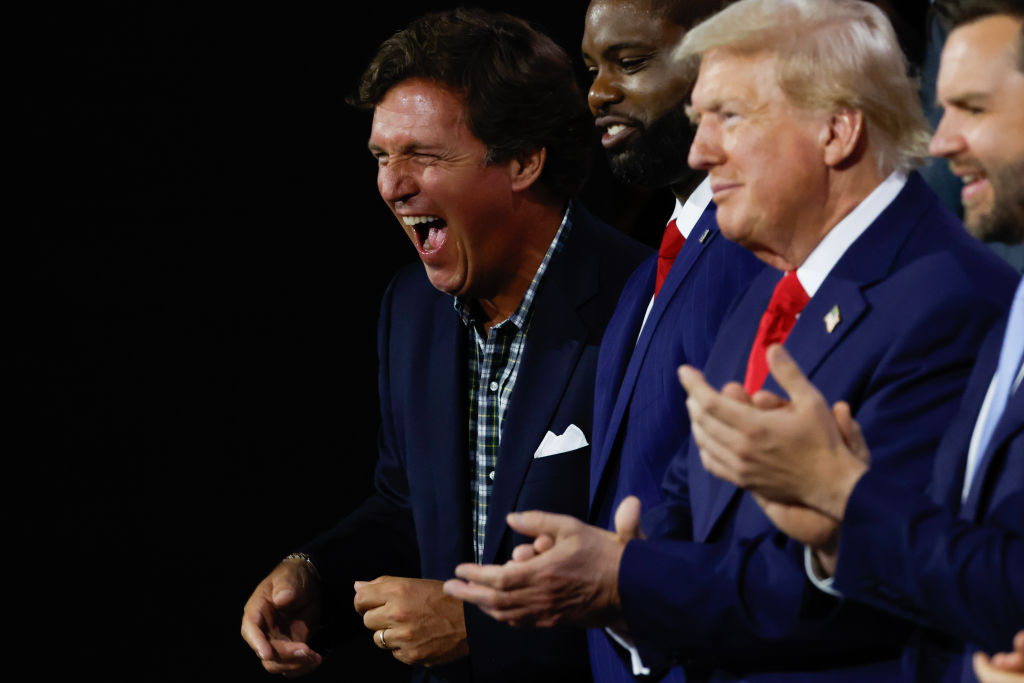
“He needs Trump now in a way that he didn’t before, and Trump needs him as well,” said Zengerle. Trump’s value to Tucker is obvious: The week after the convention, the Tucker Carlson podcast briefly overtook Joe Rogan’s as the top podcast on Spotify. Tucker’s value to the Trump campaign is that he speaks to a cohort of disaffected voters, including conspiracy theorists, the alt-right, and other varieties of cranks.
In the event Trump loses, and doesn’t run again in 2028, Carlson could very well emerge as a leading contender for the nomination if he wants it. A populist party that nominated Trump in three presidential elections in a row is a party that could nominate Tucker Carlson.
Carlson hides his worst rhetoric behind a “just asking questions” and anti-cancel-culture pose. He faced only a modest backlash from his allies over the Darryl Cooper interview. Heritage Foundation President Kevin Roberts posted a tweet defending Winston Churchill, then appeared at a Tucker Carlson Live event the next day. A “Dear Fellow Patriot” Heritage fundraising email was sent out under Tucker Carlson’s name on September 12—just 10 days after Carlson called Darryl Cooper “the most important historian in the United States.”
There were calls for Trump to distance himself from Carlson after the Cooper interview, but no such distancing occurred. “The fundamental idea here is Republicans believe not in censorship; we believe in free speech and debate,” GOP vice presidential nominee J.D. Vance said on September 6. Vance appeared at a Tucker Carlson Live event in Pennsylvania on September 21.
The Tucker Carlson Live tour has the trappings of a presidential listening tour, with the potential candidate surrounded by MAGA elites like Vance, Robert F. Kennedy Jr., and Tulsi Gabbard. The tour wrapped up on Saturday night with a joint appearance with the former GOP president’s son, Donald Trump Jr. Earlier this year, Don Jr. said he wanted his father to pick either Vance or Carlson as his running mate, and there’s no question that Carlson is the more charismatic of the two.
One might think Carlson’s association with kooks reveals a man uninterested in actually winning the presidency, but that may not be how he sees it. In his 2018 book, Carlson wrote that with continued mass immigration, coupled with job losses due to automation, it “won’t take much” to convince Americans “to vote for radical populists who will make Donald Trump look restrained.”
The mind of Tucker Carlson.
It is of course possible that Carlson doesn’t care much about money, fame, or political power for their own sake. “I don’t want to question his motives,” said Andrew Ferguson, Carlson’s former Weekly Standard colleague. “Just assume he’s saying what he believes. That, to me, is more interesting.”
“How do you explain this total shift in belief systems?” Ferguson asked. “How do you go from being a Reagan Republican to a dupe for basically a Stalinoid and a guy who wants to destroy the United States?” Ferguson noted there has always been a strain of anti-establishment skeptical thinking on the American right, and it may have just “curdled into this reflexive anti-Americanism” in Carlson.
It’s plausible that Carlson is simply motivated by a warped ideology—that his evolution toward a principled and sane non-interventionism was just a stepping stone toward the nuttier and more bigoted version of that ideology.
Carlson certainly wouldn’t be the first isolationist who gravitated toward the fever swamps of antisemitism. “I do believe that there is a pattern with [Pat] Buchanan of needling the Jews. Is that antisemitic? Yeah,” Carlson said on C-SPAN in 1999. “Pat Buchanan obviously has a lot of personal and affectionate relationships with people who are Jewish. So on a personal level, perhaps he’s not, but on a different, maybe thematic level, I think he probably is.” Carlson correctly identified antisemitism not as mere bigotry. “He believes in conspiracies,” Carlson said of Buchanan.
The old Tucker Carlson’s indictment of Buchanan is a damning indictment of the new Tucker Carlson, who has become antisemitic on a “thematic level” at least.
The promotion of Darryl Cooper is the most glaring example, but there are others. In April, Carlson hosted a Palestinian preacher who had reportedly said the day after the October 7 massacre of Israelis that he was “shocked the most by the strength of the Palestinian person who challenged his siege.” In the interview, Carlson suggested that “self-professed Christians” in America were “sending money to oppress Christians in the Middle East” by supporting Israel. One of his favorite Russia experts on his Fox News program was obsessed with the “Israeli lobby” and once said in a speech that “rootless cosmopolitans” are to blame for the world’s problems. In his 2018 book Ship of Fools, Carlson referred to those who participated in the “Unite the Right” white-nationalist protest in Charlottesville in 2017—where men carrying tiki torches were shouting “Jews will not replace us!” on the eve of the rally—merely as “conservative activists.” On his Fox show, Carlson promoted the antisemitic rapper Kanye West as a “Christian evangelist.”
Blake Neff, the lead writer for Tucker Carlson Tonight who joined Carlson from the Daily Caller in 2017, was forced to resign from Fox in 2020 over racist messages posted in an online forum. “What Blake wrote anonymously was wrong. We don’t endorse those words. They have no connection to the show,” Carlson said on air, adding that those self-righteously celebrating Neff’s firing were “ghouls.” But Carlson used the introduction of his 2021 book The Long Slide to attack his own publisher, Simon & Schuster, for canceling a book contract of Milo Yiannopoulos, a well-known alt-right antisemite. “When entertainers like Kathy Griffin and Sarah Silverman made lame jokes designed to affirm the professional class’s sense of its own moral superiority, they were praised as daring, for ‘pushing boundaries,’” Carlson wrote. “Yiannopoulos was wittier than either one of them, but he pushed real boundaries. None of our taste-makers congratulated him for it.” Perhaps it’s not surprising that a man who was running demagogic primetime cable news segments in 2017 sounding the alarm about “Gypsies: Coming to America” moved on to promoting Jew-baiting.
Unwell people often gravitate toward antisemitism and other conspiracy theories.
Is it possible Carlson has simply lost his marbles?
“He’s lost his sense of humor. He’s lost his light touch. The charm is all gone. That’s the kind of sign of someone going monomaniacal,” said Ferguson, offering an alternative explanation of Carlson’s ideological and journalistic transformation. “I don’t even think he’s talented anymore.”
Becoming a TV superstar can have deranging effects on anybody, as Carlson noted in his 2003 book. “If running for office can encourage you to imagine millions of supporters [who don’t exist], hosting a show can entirely separate you from reality,” he observed. “If you’re not careful, you can permanently lose all critical distance from yourself. One morning you wake up, and you’re living in your own irony-free world.”
That could be the world Carlson is living in today.
In the hours of Tucker Carlson podcasts and interviews I’ve listened to for this article, the most disturbing thing I heard wasn’t any conspiracy theory. It was Tucker’s laugh.
The Carlson cackle usually erupts multiple times throughout any given interview, usually when Carlson himself or his guest has said something that isn’t close to being laugh-out-loud funny.
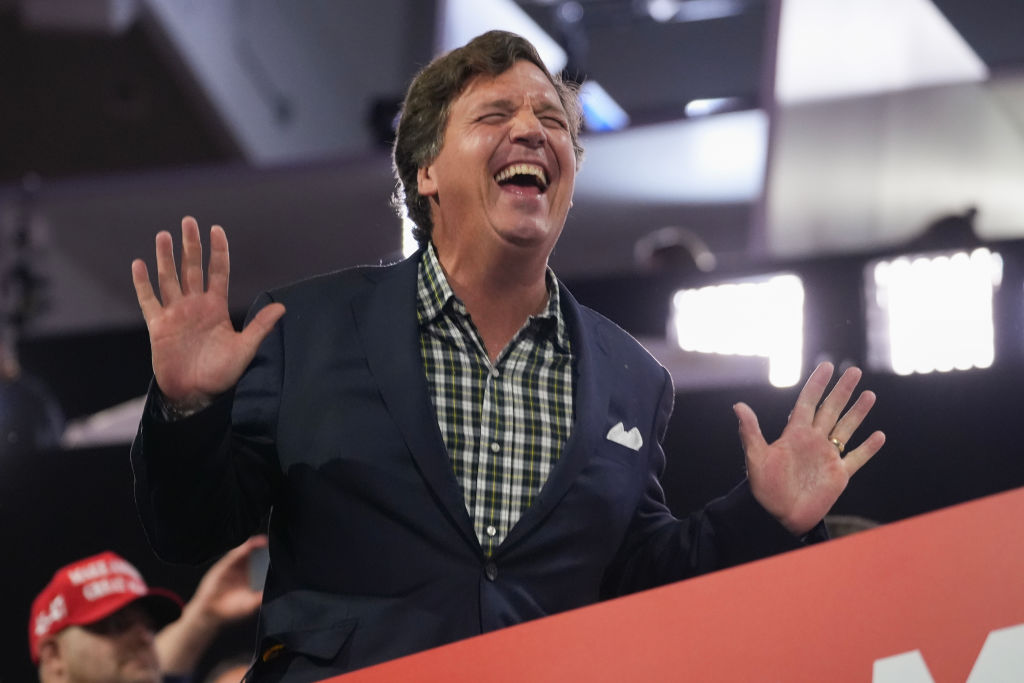
“Screw you, Taylor Swift,” Megyn Kelly said at the Tucker Carlson Live event on September 12. Carlson picked up the microphone sitting on his chair, put it to his mouth, and let out a burst of uproarious high-pitched laughter for a few seconds.
At the Carlson-Vance event on September 21, the Carlson cackle erupted four times during the first two minutes of Carlson’s opening monologue: First, before Carlson had said anything at all; then when he talked about how J.D. Vance drinks Mountain Dew; then when he mentioned there were delays entering the Carlson-Vance event because there were security checkpoints run by the federal government; and then when he suggested the delays were the deliberate work of the Biden administration. Hilarious stuff.
Carlson seems to want to convince his fans—and maybe himself—he’s having fun. It’s hard to believe he actually is.
“After food, water, and sex, the strongest human desire may be for someone interesting to talk to. It’s what drove me to journalism, and what keeps me there,” Carlson wrote in his 2003 book. The new Tucker Carlson is very rich and very famous, but when he jets around the country and the world, he’s doing it to hang out with Charlie Kirk, Jack Posobiec, Andrew Tate, and Roseanne Barr.
Barr’s conversation with Carlson on September 24 wasn’t interesting—it was insane. Members of the uniparty “eat babies,” Barr told Carlson, because they’re “full-on vampires” that “love the taste of human flesh, and they drink human blood.”
“You spent your time in the entertainment business,” Carlson told Barr, “so I think you have some authority on this.”
“Everybody still thinks I’m crazy, but I’m not crazy,” Barr said, adding that she learned of this conspiracy while spending time in mental institutions.
Carlson introduced Barr to the crowd that night by saying he’s been “furiously texting” with her ever since they met because “she’s so smart, and she’s so deep.”
Carlson has gained friends like Roseanne Barr and Alex Jones, but he’s lost plenty of others. “Everyone I love is here” in Washington, D.C., Carlson told the New Yorker in 2017. The city is “beautiful, the people are friendly,” he wrote in 2016. “Nobody wants to leave.” On September 6, Carlson said at an event with Kevin Roberts that he fled Washington after 35 years “because I have contempt for the city, and I think it’s disgusting, and I really mean that from the bottom of my heart, I do. I really mean that, and I don’t just mean the culture. I mean the individual people who live there.”
While mutual contempt played a role in Carlson’s departure from the city and people he once loved, a bigger factor may have been a traumatic incident his family endured in 2018.
That November, a group of about 20 Antifa protesters appeared outside his home, chanting: “Tucker Carlson, we will fight! We know where you sleep at night!” Carlson’s wife was home alone at the time. A devoted husband, Carlson decided to move full-time to Florida and Maine, where he owns homes on two separate islands, not long after.
A Wall Street Journal reporter traveled to Maine in July to see what life on the island was like for Carlson and found a man fairly isolated, aside from the company of his wife, his brother who lives nearby, plus the podcast guests and political allies who visit him. Carlson “avoids restaurants, partly because he says prices are out of control due to inflation, and has meals prepared for himself at home—by a chef, who says Carlson is having steak with rice and salad for the 10th dinner in a row,” the Journal reported. The same profile provided details of a second traumatic event that Carlson suffered in November 2021.
“At the table where we are having dinner,” the Journal’s Bojan Pancevski reported, Carlson said he was told by a former senior U.S. official “that the CIA had killed American citizens inside the U.S. [Carlson] was left in a state of shock after his guest departed and then collapsed on his front porch. Two of [Carlson’s] vertebrae had caved in, he says, and he was taken to the hospital for emergency surgery. The surgeon, he says, told him that it could have been a stress-related injury.” Learning of the CIA-assassination conspiracy theory was also the second of two events that led Carlson to conclude, according to the Journal, that “Russia is a better place than the U.S.” The first was the Iraq war.
If hearing about a conspiracy theory literally made Carlson collapse due to shock and stress, maybe he really has lost touch with reality.
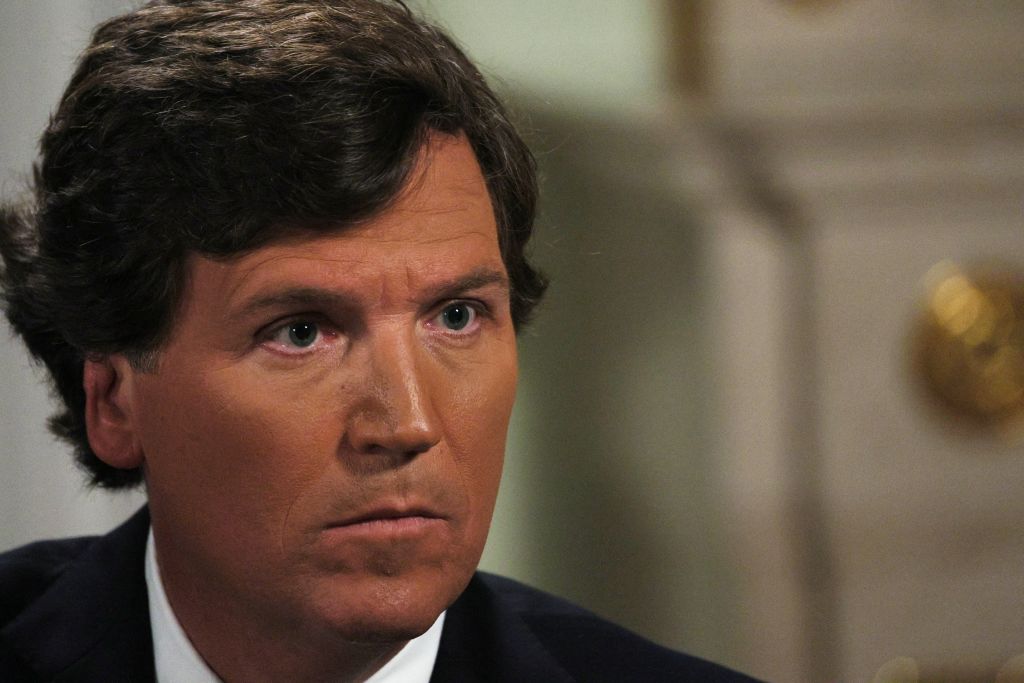
Or maybe he knows exactly what he’s doing.
“At the most basic level, the news you consume is a lie, a lie of the stealthiest and most insidious kind,” Carlson said on May 9, 2023, a few weeks after he had been fired from Fox News, to announce his new show on Twitter. “Facts have been withheld on purpose, along with proportion and perspective. You are being manipulated.”
Carlson has routinely engaged in that kind of behavior. Consider three examples.
In October 2022, Carlson interviewed Kanye West after the rapper attended an event with Candace Owens where the two wore White Lives Matter T-shirts. Carlson introduced West to his 3 million Fox viewers as a “Christian evangelist” whose enemies have dismissed West “as mentally ill, too crazy to take seriously.” But based on the interview, Carlson said, he concluded West was not crazy.
“He has his own ideas, we can say that. Creative people tend to. That’s why they’re artists, not actuaries,” Carlson said. “But crazy? That was not our conclusion. In fact, we’ve rarely heard a man speak so honestly and so movingly about what he believes, but again, you can judge for yourself.”
Vice News later reported West’s most insane comments had been edited out of the interview. West told Carlson, in unaired footage, that there were “fake children” planted in his home to manipulate his own kids. The interview also edited out an antisemitic trope. “I prefer my kids knew Hanukkah than Kwanzaa. At least it will come with some financial engineering,” West said in unaired footage.
Soon after his Tucker Carlson interview, West’s public outbursts of antisemitic insanity became far worse.
“I’m going death con 3 On JEWISH PEOPLE,” West posted on Instagram soon after his appearance. A couple of months later, West appeared on Alex Jones’s InfoWars program alongside Holocaust denier Nick Fuentes. Wearing a head-covering that completely covered his face, West brought out a net and a bottle of Yoo-hoo and started ranting about Benjamin Netanyahu, the Israeli prime minister. The performance was enough to make Alex Jones seem uncomfortable. “Every human being has something of value that they brought to the table, especially Hitler,” West said in the same Infowars appearance.
Carlson never updated his viewers about the behavior of the man he’d promoted as a “Christian evangelist” who is not crazy.
A second piece of evidence that Carlson knows what he’s doing is his false portrayal of Alex Jones as the “prophet” of 9/11. “Alex Jones predicted 9/11,” Carlson said at his event with Jones in Pennsylvania on September 23. “Alex Jones, in the summer of 2001, said, ‘You need to call the White House right now because planes are going to hit the World Trade Center, and they’re going to blame it on Osama bin Laden.’ He said that. I’ve seen the tape. You can look it up.”
Jones did not predict 9/11. He did not say, as Carlson claimed, that “planes are going to hit the World Trade Center.” In a July 2001 InfoWars episode, Jones said: “Call the White House and tell them we know the government’s planning terrorism. We know Oklahoma City and World Trade Center was terrorism. We know the joint chiefs of staff wanted to blow up airliners—Baltimore Sun. If you do it, we’re going to blame you, because we know who’s up to it, where you let some terrorist group do it, like the World Trade Center” bombing of 1993. During the show, Jones also mentioned Osama bin Laden, the leader of al-Qaeda, as a “CIA asset” and the “bogeyman they need in this Orwellian phony system.”
Carlson’s podcast spliced together clips in rapid succession—of Jones saying the joint chiefs want to blow up airliners (not use them as missiles), mentioning the (1993) World Trade Center bombing, and mentioning bin Laden—that make Jones seem more like a prophet than the broken clock that he is. If you’re always predicting false-flag terrorism over the horizon that will be used as a pretext by globalists to impose tyranny, it’s not surprising that in 2001 you’d mention the leader of the terrorist group responsible for the 2000 USS Cole bombing, the 1998 U.S. embassy bombings in Africa, and the 1993 World Trade Center bombing.
Carlson’s private text messages to his Fox News staff are a third piece of evidence that he knows what he’s doing. Released as part of the Dominion Voting Systems defamation lawsuit against Fox, Carlson’s texts revealed a man who seemed to be of completely sound mind from November 2020 to January 2021.
“I’d heard that about [Trump planning not to attend] the inauguration. Hard to believe. So destructive,” Carlson said in a text message on November 10, 2020. “It’s disgusting. I’m trying to look away.”
“We are very, very close to being able to ignore Trump most nights. I truly can’t wait,” Carlson texted on January 4, 2021. “I hate him passionately.”
“Trump has two weeks left. Once he’s out, he becomes incalculably less powerful, even in the minds of his supporters,” Carlson texted on January 7, 2021. “He’s a demonic force, a destroyer. But he’s not going to destroy us. I’ve been thinking about this every day for four years.”
Carlson’s text calling Trump “demonic” immediately brought to mind a brief conversation I had with him in the Fox News green room in the spring of 2016.
I never knew him well, but Carlson invited me to lunch at The Palm once when I was 25 to offer me a job at Daily Caller. We talked over lunch in 2011 about how we had similar career aspirations in college—journalist, CIA officer, or history professor—and how events led us to journalism. We also talked about how The Weekly Standard, where I decided to stay until the magazine was shut down by its owner in 2018, was a wonderful place to work. We might briefly chat if we bumped into each other on the street after that.
In March 2016, when Carlson saw me in the Fox News green room, he started complaining about the headline of a Weekly Standard online article condemning “Vichy Republicans” supporting Donald Trump. “Come on, Trump’s not evil,” Carlson told me. “He’s just mentally ill.” When the “demonic” text message was released, it was darkly amusing to see how four years of experience had changed his mind about the first half of his assessment.
Carlson’s texts also brought to mind his old comments about Bill O’Reilly. “Like everyone in TV, he has a shtick,” Carlson wrote in his 2003 book. O’Reilly’s shtick was a working-man populist, and his “success is built on the perception that he really is who he claims to be. If he ever gets caught out of character, it’s over. If someday he punches out a flight attendant on the Concorde for bringing him a glass of warm champagne, the whole franchise will come tumbling down.”
If Bill O’Reilly throwing a champagne glass would bring the whole O’Reilly franchise down, then what would the revelation that Tucker Carlson had called Trump “demonic”—specifically in response to January 6, 2021—cost him among the MAGA faithful?
Pretty much nothing, it turned out—for two reasons.
First, Carlson sniffed the throne. He sucked up to Trump. “I’m pretty straightforward,” Carlson said in a cleanup radio interview following the release of his text messages in March 2023. “I’m, um, I love Trump.”
“Like as a person,” he added. “I think Trump is funny and insightful, and I said this to Trump when he called me, you know, all wounded about those texts.”
Carlson played off the comment about passionately hating Trump as a one-off moment of anger because a Trump staffer sent him false information, repeated by Carlson on air, about a dead person who voted. That incident occurred in November 2020. No one who knew Tucker Carlson thinks that January 2021 text is the only time he said he hated Trump. “I remember him saying that he thought Trump was nuts and had utter contempt for him,” Ferguson said of his last lunch with Carlson early in the Trump era.
“I think my texts reflect who I am,” Carlson said in the March 2023 radio interview. “I always say what I think. I can’t keep track of too many lies, you know what I mean?”
The second reason why Carlson’s January 6 texts didn’t damage his standing with the MAGA faithful is that he had spent the previous two years promoting conspiracy theories about January 6.
“FBI operatives were organizing the attack on the Capitol on January 6, according to government documents,” Carlson falsely claimed in June 2021. He later added that “it turns out that this ‘white supremacist’ insurrection was, again by the government’s own admission in these documents, organized at least in part by government agents.”
In the fall of 2021, Carlson released a January 6 special called Patriot Purge—replete with images of black helicopters and a prisoner in an orange jumpsuit being waterboarded—depicting the U.S. government hunting down those who broke into the Capitol as if they were al Qaeda terrorists being sent to Guantanamo Bay. “It is my opinion that false flags have happened in this country, one of which may have been January 6,” a woman said in the trailer of Patriot Purge. Darren Beattie, who was fired from the Trump White House in 2018 for speaking at a conference with ties to white nationalists, said in Patriot Purge: “Was 1/6 the result of an intelligence failure … or was 1/6 the result of an intelligence set-up?”
The release of Patriot Purge itself raises a few questions about what happened to Tucker Carlson.
Had he simply embraced crazy January 6 conspiracy theories because that’s where his audience was heading?
Had it dawned on him, before or after the March 2021 filing of the Dominion lawsuit, that his January 6 text messages were going to become public at some point—and he needed to protect the franchise after having broken character so badly?
Had he actually come to believe it?
Whatever his thinking may have been at the time, after his years-long pivot toward conspiracy theories, it’s hard to assess Carlson’s grasp of reality.
In an appearance on the Joe Rogan podcast this year, Carlson promoted 9/11 conspiracy theories by mocking the idea that Building 7 of the World Trade Center—a 47-story office building north of the Twin Towers—could have collapsed the way it did due to jetliners flying into the Twin Towers. He also spoke of why he used to get angry when he heard Alex Jones talking about 9/11. “The reason that I did was because if you call that into question, you had to ask a lot of other really obvious questions you didn’t want to deal with, and you might arrive at the conclusion that a lot of your most basic assumptions are false and that you’ve been had, and it’s just too destabilizing maybe,” Carlson told Rogan.
Rogan then pointed to evidence there was no Building 7 conspiracy: “There’s diesel generators that are in the basement, so they have all this fuel, so they have this incredible inferno in the basement that weakens the structure. Is that why it collapsed? Maybe.”
“Totally possible. A lot of building engineers disagree with that, as you know,” Carlson replied. “They don’t think that could have happened in the way you just described. I’m agnostic on it … because I don’t know the answer and I have no way of knowing.”
The Tucker Carlson who told off 9/11 truthers in 2008 and 2012 wouldn’t have recognized what had become of him by 2024.
“Have you ever heard of the Controlled Demolition Hypothesis … Who I believe did it are the ones who control our money systems,” the 9/11 truthers asked Carlson at the 2008 Ron Paul rally. “Have you followed the [National Institute of Standards and Technology] report on the collapse of Building 7?”
After engaging with the conspiracy theorists for a while in Minneapolis, Carlson turned to his close friend and former Weekly Standard colleague Matt Labash, who was covering the rally, and said: “This is crazy. I’ve got to get out of here. Let’s go get dinner.”
Correction, October 1, 2024: This article originally reported that Tucker Carlson graduated from Trinity College. Although the claim has been widely reported, Carlson told a biographer that he did not have the credits needed to graduate.
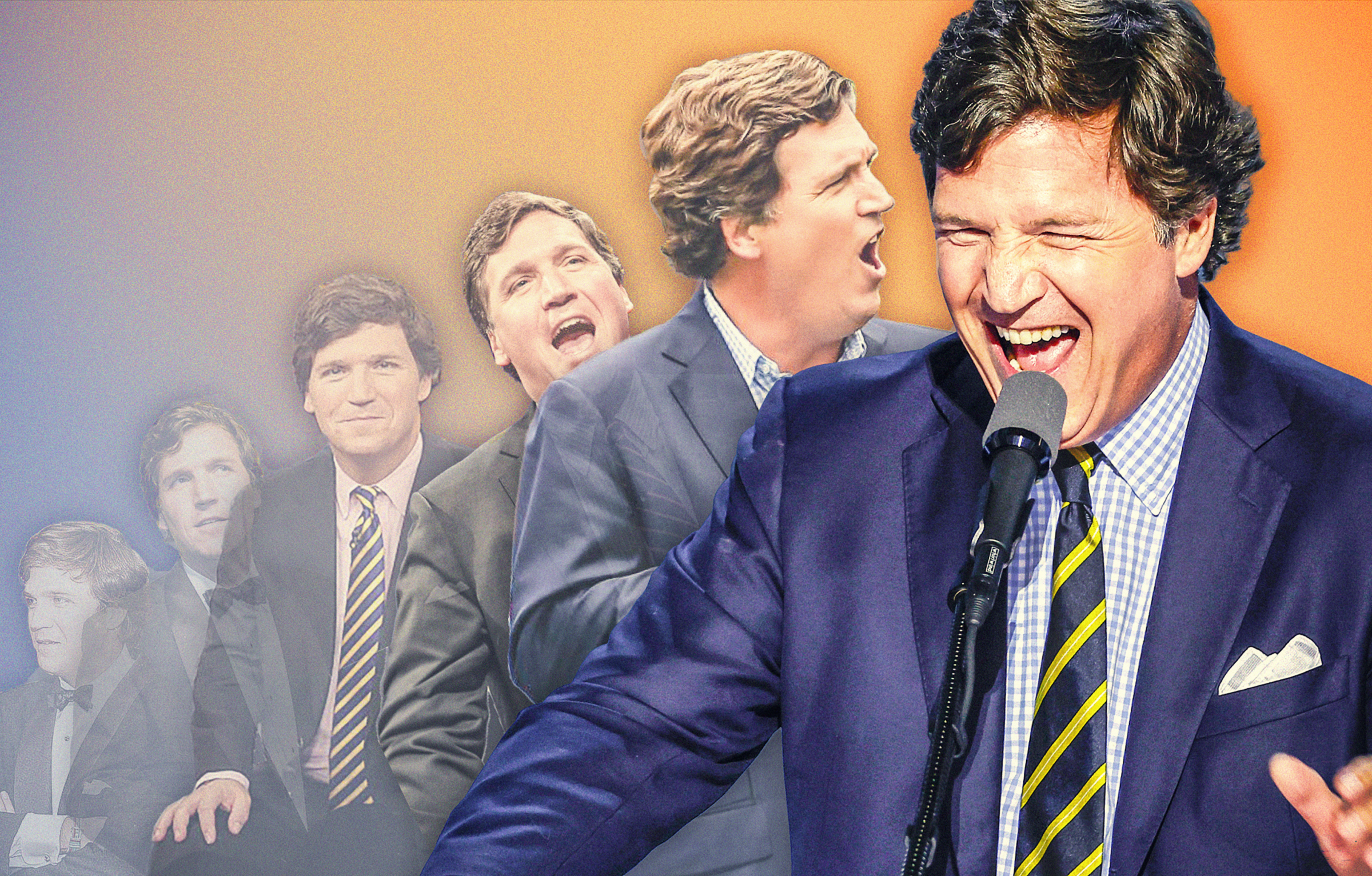

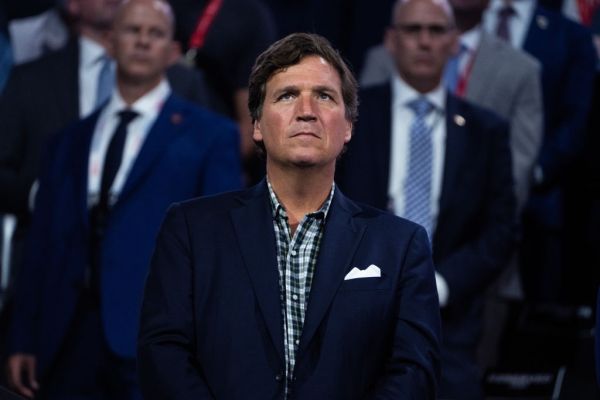
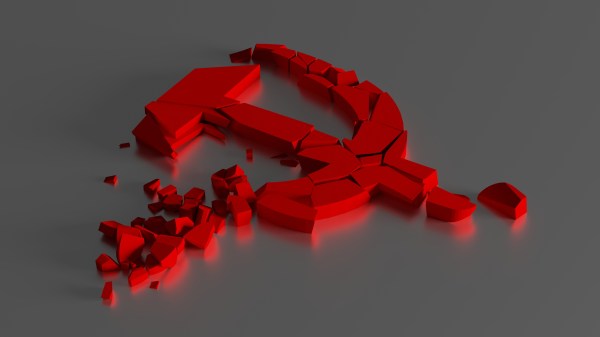
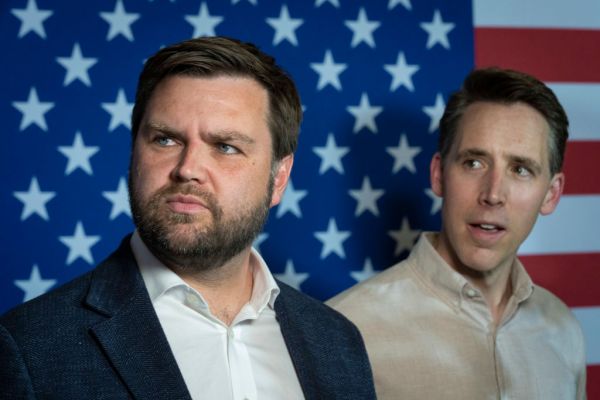

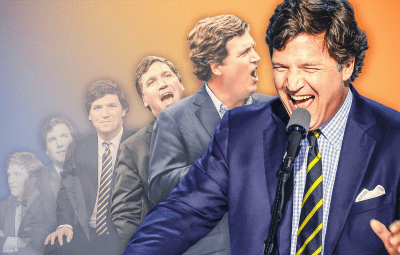
Please note that we at The Dispatch hold ourselves, our work, and our commenters to a higher standard than other places on the internet. We welcome comments that foster genuine debate or discussion—including comments critical of us or our work—but responses that include ad hominem attacks on fellow Dispatch members or are intended to stoke fear and anger may be moderated.
With your membership, you only have the ability to comment on The Morning Dispatch articles. Consider upgrading to join the conversation everywhere.